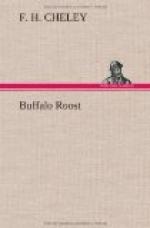“Dad, how is your good health these days?” inquired Mr. Allen, as he handed the old man a little package he had taken from his haversack. Dad took it, smelled it through the paper; then a pleased smile spread over his face.
“Smells like grains o’ gold, Mr. Hallen. Thank ye. As fer me health, never was no better sence I been here. A man can’t git sick a livin’ out in this yere country all his life. I’ll be ninety-five now, in jist a few weeks, an’ I’m as spry now as most any o’ yew fellers. I’ll live longer’n some o’ ye yit. Yep, I’m feelin’ mighty spry agin sence Tad’s got back. Kind o’ seems like the old days afore the shanty was burned. I ca’calate them there devils must o’ injoyed that performance.”
The fellows all stood at attention. Was the Road House story really coming, and from Dad’s very own lips?
“It must have been a sad sight, wasn’t it, Dad, to see your home demolished in that fashion?” quietly suggested Mr. Allen, by way of encouragement.
“’T wan’t near as sad a sight as some I have seed,” replied the old man. “‘Bout the saddest sight I ever seed was of an old pard o’ mine a wanderin’ over these almighty hills a sorrowin’ out his life after he’d lost his right down best friend in a mine cave-in. Poor old boy, he took it mighty serious. He used to be the happiest prospector I ever swapped lies with, till that devilish old tunnel caved in an’ crushed the life out o’ the feller’s pardner. He hain’t never ben no ’count sence, till lately. Now an’ then he’d take a long, wanderin’ trip back into these yere gloomy ol’ gulches, an’ I’ve seed them as say they’ve heerd him away off in the hills at night a callin’ his pardner’s name, an’ a sobbin’ an’ a carryin’ on. He’s a strong man—that’s why he gits out into God Almighty’s hills to open his troubled heart, ‘stead o’ tellin’ his lonesomeness to men as would make fun o’ him. That’s ’bout the sorriest sight I ever seed, an’ I’ve seed ’bout my share on ’em—Indian killin’s, dynamite explosions, an’ sech like. ’T ain’t many fellers ever has as real a friend as that!”
“What finally happened to your friend, Dad—did he get over his sorrow after a while?”
“No, no, my boy, he never got over it. He got on top of it. I mind now how he was gone a long spell in the timber; no grub, no duffel, no nothin’—only his ol’ gun. He lived off’n the bounty o’ these yere wooded hills, an’ he let the spell o’ God Almighty’s woods an’ crags an’ streams heal up his broken heart. Then he came back. I remember one mornin’ he come to my shanty, and a hungrier, starveder, wild-eyed feller ye never seed in yer born days than him; but shoot me fer a pole-cat if he didn’t come back a smilin’. I was skeered he’d lost his mind. I was a pannin’ mud in the gulch up back o’ the shanty when he come ’long the trail. I jist looked, then I knowed what had happened. He had licked that awful sorrow. He’s ben off down in civilization now fer these ten years, but now he’s back agin. The silent company is callin’ him, he says, an’ he jist has to have a free breath an’ a little more pasture, an’ this is the only place he can git it.”




